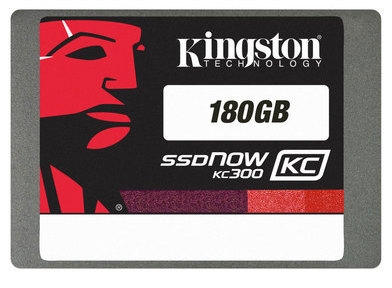Cercar controladors per identificació o nom del dispositiu
Dispositius coneguts:165022367
L'últim controlador conegut:23.12.2020
Kingston Showcases New SSDNow KC300 Series
Kingston Digital, an established developer and supplier of highly efficient storage solutions, has officially introduced its new line of solid-state drives that entered SSDNow series. Entitled KC300, this line is targeted at a vast audience, starting from corporate clients and finishing with average customers. KC300 includes five models of 60 GB, 120 GB, 180 GB, 240 GB, and 480 GB capacities. According to Kingston, the new entries are supposed to substitute the two preceding SSD lines: Kingston KC100 and Kingston V+200.

SSDs KC300 are designed in 2.5-inch form-factor and feature SATA III 6 Gb/sec interface. LSI SandForce SF-2281 controller is the heart of each drive model. All items included in the series support DuraClass, DuraWrite, S.M.A.R.T. and RAISE technologies that substantially enhance their efficiency. The same way, all the drives are able to complete an automatic data encoding by means of two integrated encoding engines, which work with AES-128 and AES-256 algorithms.
The new-comers are positively characterized by their reliability and stability of operation. Thus, claimed by the developers Mean Time Between Failures index approximates one million hours; at the same time, reliability index (Total Bytes Written) fluctuates within the ranges of 47 Tb in 60 GB model to 375 Tb in 480 GB model. Besides, these solid-state drives are backed by 3-years’ limited warranty.
With regard to performance, KC300 series might be called highly efficient. The maximal Read/Write speed on successive operations makes up 500 Mb/sec and 525 Mb/sec correspondingly. In the matter of speed on random operations, efficiency index varies depending on the drive capacity. Hence, the maximal random Read/Write speed (4 KB) for 60 GB, 120 GB and 180 GB models makes up 84.000 IOPS and 64.000 IOPS; these showings differ with 240 GB model, making up 84.000 IOPS and 52.000 IOPS correspondingly. 480 GB SSD model proves to be the least efficient, demonstrating 73.000 IOPS on random Read operations and 32.000 IOPS on random Write operations.

SSDs KC300 are designed in 2.5-inch form-factor and feature SATA III 6 Gb/sec interface. LSI SandForce SF-2281 controller is the heart of each drive model. All items included in the series support DuraClass, DuraWrite, S.M.A.R.T. and RAISE technologies that substantially enhance their efficiency. The same way, all the drives are able to complete an automatic data encoding by means of two integrated encoding engines, which work with AES-128 and AES-256 algorithms.
The new-comers are positively characterized by their reliability and stability of operation. Thus, claimed by the developers Mean Time Between Failures index approximates one million hours; at the same time, reliability index (Total Bytes Written) fluctuates within the ranges of 47 Tb in 60 GB model to 375 Tb in 480 GB model. Besides, these solid-state drives are backed by 3-years’ limited warranty.
With regard to performance, KC300 series might be called highly efficient. The maximal Read/Write speed on successive operations makes up 500 Mb/sec and 525 Mb/sec correspondingly. In the matter of speed on random operations, efficiency index varies depending on the drive capacity. Hence, the maximal random Read/Write speed (4 KB) for 60 GB, 120 GB and 180 GB models makes up 84.000 IOPS and 64.000 IOPS; these showings differ with 240 GB model, making up 84.000 IOPS and 52.000 IOPS correspondingly. 480 GB SSD model proves to be the least efficient, demonstrating 73.000 IOPS on random Read operations and 32.000 IOPS on random Write operations.
Comments 0
Collapse comments / Expand comments